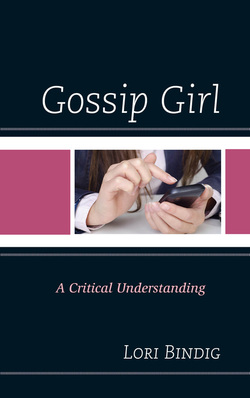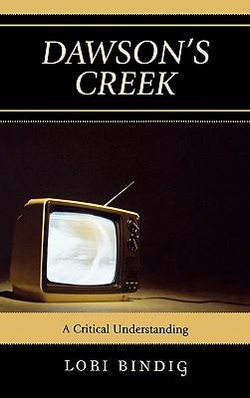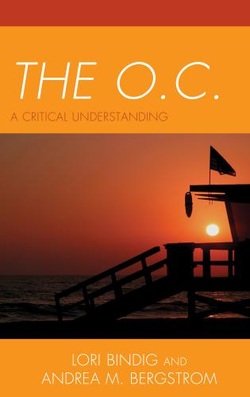Books

Bindig, L. (2015). Gossip Girl: A Critical Understanding. Lanham, MD: Lexington Books.
"Lori Bindig has written a book that elegantly and seamlessly demonstrates how media scholars can integrate a political economy approach with a cultural analysis of how texts both produce and reproduce hegemonic (and in some cases counter-hegemonic) ideologies of gender, race, and class. Gossip Girl: A Critical Understanding introduces students to a nuanced and sophisticated understanding of media theory while at the same time deftly applying key concepts to interrogate how the show was produced and consumed within a complex set of economic and cultural contexts."
— Gail Dines, Wheelock College
"Bindig’s analysis provides an engaging model of a critical cultural studies approach to a television series, ideal for classroom use. With detailed analysis of Gossip Girl’s six seasons, careful dissection of its place within the media industries, and thoughtful consideration of its fans’ investment in the show, Bindig delivers a thorough picture of the impact of this popular series."
— Elana Levine, University of Wisconsin-Milwaukee
"With a sophisticated theoretical view and sound methodological approach, this book has much to teach us about the power and influence of contemporary television. Comprehensive in its analysis of Gossip Girl, it is also a delightful read. These pages are full of insights that connect the program to everyday life, and help scholars and students alike understand that such an exceptional work of critical media studies can illuminate the world we live in."
— Robin Andersen, Fordham University
Gossip Girl: A Critical Understanding provides a critical analysis of The CW’s hit teen television drama Gossip Girl. Lori Bindig analyzes episodes as a set of media texts that blur the boundaries between hegemonic and counter-hegemonic content. Using political economy, textual and audience analyses, Bindig dissects how the show presents ideological content in regard to gender, race, class, sexuality, and consumerism, ultimately unearthing potential ramifications of Gossip Girl and other popular media texts. In addition, Bindig examines the expansive fan community and its engagement with the show through online forums and YouTube. Gossip Girl: A Critical Understanding will appeal to scholars of media, audience studies, and popular culture.
"Lori Bindig has written a book that elegantly and seamlessly demonstrates how media scholars can integrate a political economy approach with a cultural analysis of how texts both produce and reproduce hegemonic (and in some cases counter-hegemonic) ideologies of gender, race, and class. Gossip Girl: A Critical Understanding introduces students to a nuanced and sophisticated understanding of media theory while at the same time deftly applying key concepts to interrogate how the show was produced and consumed within a complex set of economic and cultural contexts."
— Gail Dines, Wheelock College
"Bindig’s analysis provides an engaging model of a critical cultural studies approach to a television series, ideal for classroom use. With detailed analysis of Gossip Girl’s six seasons, careful dissection of its place within the media industries, and thoughtful consideration of its fans’ investment in the show, Bindig delivers a thorough picture of the impact of this popular series."
— Elana Levine, University of Wisconsin-Milwaukee
"With a sophisticated theoretical view and sound methodological approach, this book has much to teach us about the power and influence of contemporary television. Comprehensive in its analysis of Gossip Girl, it is also a delightful read. These pages are full of insights that connect the program to everyday life, and help scholars and students alike understand that such an exceptional work of critical media studies can illuminate the world we live in."
— Robin Andersen, Fordham University
Gossip Girl: A Critical Understanding provides a critical analysis of The CW’s hit teen television drama Gossip Girl. Lori Bindig analyzes episodes as a set of media texts that blur the boundaries between hegemonic and counter-hegemonic content. Using political economy, textual and audience analyses, Bindig dissects how the show presents ideological content in regard to gender, race, class, sexuality, and consumerism, ultimately unearthing potential ramifications of Gossip Girl and other popular media texts. In addition, Bindig examines the expansive fan community and its engagement with the show through online forums and YouTube. Gossip Girl: A Critical Understanding will appeal to scholars of media, audience studies, and popular culture.

Bindig, L. (2008). Dawson’s Creek: A Critical Understanding. Lanham, MD: Lexington Books.
"Dawson's Creek: A Critical Understanding impressively deconstructs one of the most influential and popular "Teen TV" programs in history. Using detailed analysis, Lori Bindig highlights the symbolic complexity of the series and illustrates how youth culture intersects with different ideological dimensions, including gender, race, class, sexual orientation, and brand-obsessed consumption."
—Matt McAllister, Penn State University
Dawson's Creek: A Critical Understanding provides a textual analysis of the WB's hit teen drama that ran from 1998 to 2003. Author Lori Bindig analyzes episodes of Dawson's Creek as a set of media texts that blur the boundaries between hegemonic and counter-hegemonic content. Exploring the ideology encoded within Dawson's Creek from a feminist cultural studies perspective, Bindig examines gender, race, class, sexuality, and consumerism as it is presented in the show. The depiction of each of these five ideological concepts is discussed beyond the framework of the series and put into a larger social context, allowing a discussion of the potential ramifications of the television program. This book suggests that although Dawson's Creek includes counter-hegemonic story lines, ultimately the political-economic realities of the current media system undercuts the oppositional content and frames the program as hegemonic. Nevertheless, Dawson's Creek is a valuable tool in navigating the ongoing struggle against social inequality, illustrating how far society has come and how far it has yet to go.
"Dawson's Creek: A Critical Understanding impressively deconstructs one of the most influential and popular "Teen TV" programs in history. Using detailed analysis, Lori Bindig highlights the symbolic complexity of the series and illustrates how youth culture intersects with different ideological dimensions, including gender, race, class, sexual orientation, and brand-obsessed consumption."
—Matt McAllister, Penn State University
Dawson's Creek: A Critical Understanding provides a textual analysis of the WB's hit teen drama that ran from 1998 to 2003. Author Lori Bindig analyzes episodes of Dawson's Creek as a set of media texts that blur the boundaries between hegemonic and counter-hegemonic content. Exploring the ideology encoded within Dawson's Creek from a feminist cultural studies perspective, Bindig examines gender, race, class, sexuality, and consumerism as it is presented in the show. The depiction of each of these five ideological concepts is discussed beyond the framework of the series and put into a larger social context, allowing a discussion of the potential ramifications of the television program. This book suggests that although Dawson's Creek includes counter-hegemonic story lines, ultimately the political-economic realities of the current media system undercuts the oppositional content and frames the program as hegemonic. Nevertheless, Dawson's Creek is a valuable tool in navigating the ongoing struggle against social inequality, illustrating how far society has come and how far it has yet to go.

Bindig, L. and Bergstrom A. M. (2013). The O.C.: A Critical Understanding. Lanham, MD: Lexington Books.
"This engaging book fascinates with its detailed reading of The O.C., its well-grounded theory, and its numerous insights into the multiple spaces of television programming. The authors trace the program’s historical trajectory, and understand that the medium shapes and is shaped by the youth culture it speaks to."
— Robin Andersen, Fordham University
The O.C.: A Critical Understanding, by Lori Bindig and Andrea M. Bergstrom, is a critical cultural studies analysis of FOX’s hit teen television drama The O.C. (2003-2007). Episodes of The O.C. are analyzed as a set of media texts that blur the boundaries between hegemonic and counter-hegemonic content. This analysis utilizes ancillary media such as director commentary to understand how ideological messages in regards to gender, race, class, sexuality, and consumerism are presented throughout the show. The O.C. is also examined in terms of audience analysis, auteur theory, aesthetics, and reality television spin-offs. Bindig and Bergstrom place The O.C. in a larger social context and explore the potential ramifications of popular media texts, as well as the series' cultural legacy which continues to resonate in media and culture.
"This engaging book fascinates with its detailed reading of The O.C., its well-grounded theory, and its numerous insights into the multiple spaces of television programming. The authors trace the program’s historical trajectory, and understand that the medium shapes and is shaped by the youth culture it speaks to."
— Robin Andersen, Fordham University
The O.C.: A Critical Understanding, by Lori Bindig and Andrea M. Bergstrom, is a critical cultural studies analysis of FOX’s hit teen television drama The O.C. (2003-2007). Episodes of The O.C. are analyzed as a set of media texts that blur the boundaries between hegemonic and counter-hegemonic content. This analysis utilizes ancillary media such as director commentary to understand how ideological messages in regards to gender, race, class, sexuality, and consumerism are presented throughout the show. The O.C. is also examined in terms of audience analysis, auteur theory, aesthetics, and reality television spin-offs. Bindig and Bergstrom place The O.C. in a larger social context and explore the potential ramifications of popular media texts, as well as the series' cultural legacy which continues to resonate in media and culture.